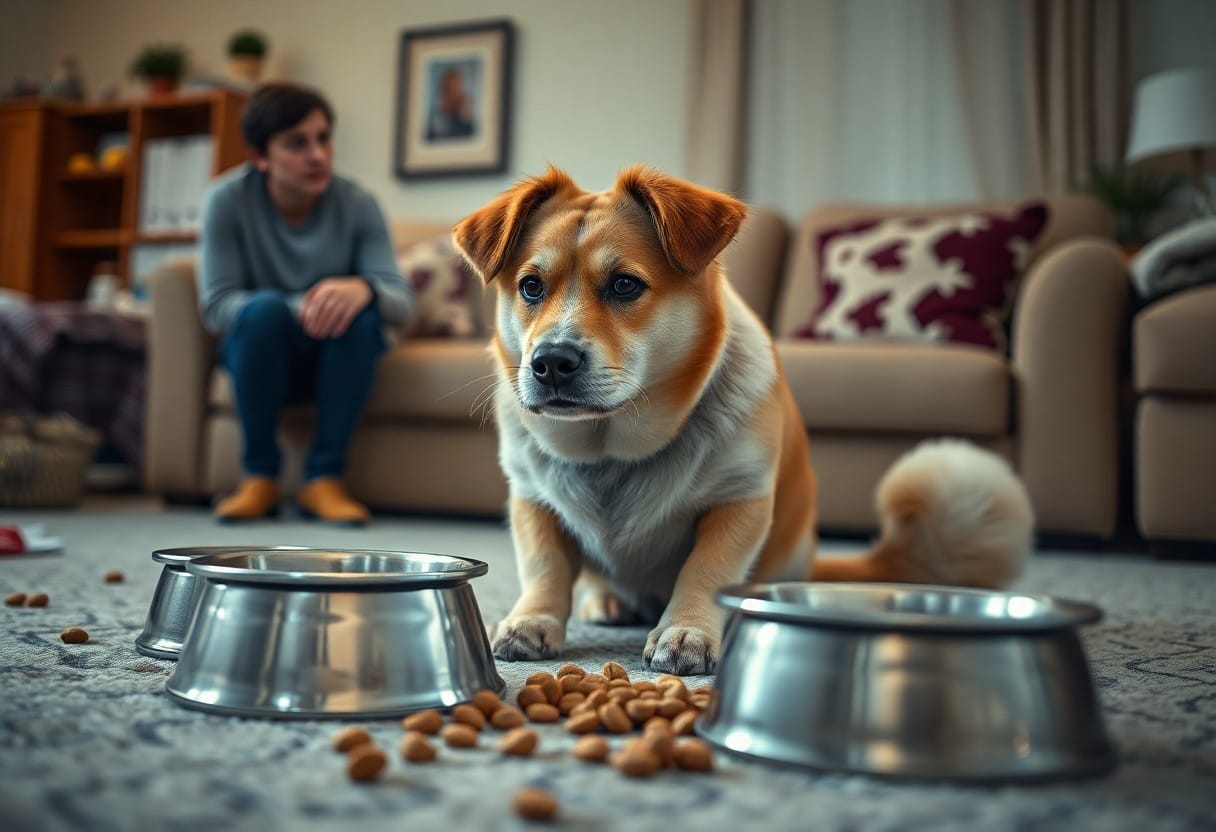
Signs Your Dog Is Overeating and What to Do About It
Share
It's important to recognize the signs of overeating in your dog, as this behavior can lead to serious health issues like obesity and gastrointestinal problems. If you notice your pup exhibiting increased appetite, weight gain, or consistent begging, these could be indications that your furry friend is indulging too much. In this post, you will learn about the safety risks linked to overeating and discover effective strategies to help your dog maintain a healthy weight and lifestyle.

Key Takeaways:
- Behavioral Changes: Watch for signs such as increased begging, scavenging, or food guarding, which may indicate that your dog is overeating.
- Physical Symptoms: Excess weight, bloating, and lethargy can be clear indicators of overeating and may lead to serious health issues.
- Feeding Guidelines: Implement portion control and regular feeding schedules to manage your dog's diet and prevent overeating.
Recognizing the Signs of Overeating in Dogs
Before you can address your dog's potential overeating habits, it's vital to recognize the signs that indicate a problem. Dogs, much like humans, can exhibit behavioral changes when their eating habits are not aligned with their needs. Being observant of your pup's behavior can help you identify whether they are consuming too much food or begging for more. If you notice that your dog seems constantly hungry, raiding the trash, or begging for food even after meals, this could signal an issue with overeating. These behaviors not only point to a hunger-driven mindset but may also suggest that your dog is not receiving the right nutrients or is potentially overindulging, leading to unhealthy weight gain.Struggling to curb your dog’s table-begging habits? Check out these 5 effective tips to stop your dog from begging at the table and enjoy stress-free mealtimes!
Behavioral Indicators
With these behavioral indicators, you may also observe an increase in hyperactivity or restlessness. This can manifest as excessive pacing, barking, or even aggressive behaviors towards food or toys. Your dog might behave as if they are anxious or preoccupied with food, which can further exacerbate their overeating tendencies. These actions not only indicate a potential eating issue but may also affect their overall well-being, leading to stress and anxiety that can be detrimental to their health.
Physical Symptoms
Below the surface, the signs of overeating can become more apparent through your dog's physical symptoms. One of the key indicators is a noticeable weight gain, which can usually be judged through regular weigh-ins and monitoring their body condition score. A dog that has gained weight will often show signs such as an inability to perform normal activities, a lack of energy, or difficulty breathing during exercise. Additionally, if your dog has an upset stomach, frequently vomits, or shows signs of diarrhea after meals, this may also indicate that they are overeating or consuming inappropriate food.
For instance, dogs suffering from overeating may develop conditions such as bloating, which is a serious stomach condition that can be life-threatening. You might notice your dog exhibiting signs of discomfort—all while showing a persistently distended belly. It's important to keep a close eye on their physical condition and behavior, as these symptoms may require immediate veterinary attention, particularly if they signify a more severe health issue. Recognizing these indicators early on can help safeguard your dog's well-being and prevent long-term complications related to their eating habits.
Common Causes of Overeating
Even with your best intentions, it's important to recognize that various factors can lead to your dog overeating. Understanding these common causes not only helps you address the issue but also allows you to create a more conducive environment for healthy eating habits. Many dogs struggle with boredom, leading them to snack mindlessly on their food or anything they can find around the house. Additionally, changes in your dog's routine, such as being home alone more often or a lack of adequate exercise, can increase their tendency to overeat. Other factors, like the availability of food and less strict feeding schedules, might also contribute to this behavior, making it necessary for you to take control of how and when your dog eats.
Environmental Factors
Environmental influences can play a significant role in your dog's overeating habits. If your pup has access to scraps of food from family members or scavenges through the trash, they may develop a habit of overeating. Here are some common environmental factors that could lead to this behavior:
- Food accessibility
- Lack of structured meal times
- Increased free time
- Stressful changes
The more opportunities your dog has to eat outside their regular meals, the greater the chance they will overindulge.
Psychological Triggers
Overeating can also stem from psychological triggers that affect your dog's behavior. Many dogs experience feelings of stress, anxiety, or loneliness, which can lead them to seek comfort in food. Whether it's due to a recent move, changes in the household, or even separation from you, your dog may turn to their food bowl as a source of solace. This behavior is sometimes compounded by lack of mental stimulation and exercise, leaving your pup feeling unsettled and inclined to eat more in response.
Consequently, it's important to be vigilant about your dog's emotional needs and provide a stable environment. Offering consistent routines, ample playtime, and interactive toys can help alleviate anxiety. Additionally, if you suspect emotional triggers are at play, consider consulting with a professional dog trainer or animal behaviorist for tailored strategies. The combination of attentive care and mindfulness of your dog's emotional well-being can significantly reduce overeating tendencies while enhancing their overall quality of life.

Health Risks Associated with Overeating
For dog owners, it is necessary to be aware of the health risks associated with overeating. Overindulgence can lead to a variety of serious health conditions that can significantly impact your dog's quality of life.
Obesity and Related Conditions
About 70% of dogs in the United States are considered overweight or obese, which can lead to a multitude of related health problems. As you may already know, obesity increases the risk of conditions such as diabetes, heart disease, and joint issues like arthritis. These health issues not only affect your dog's mobility and energy levels but can also shorten their lifespan. Consequently, managing your dog's weight through careful diet and exercise is necessary for their overall well-being.
Digestive Issues
Digestive problems can also stem from your dog's overeating habits, leading to discomfort and distress. Feeding your dog excessive portions can overwhelm their digestive system, causing issues such as gas, bloating, and diarrhea. This can result in your dog experiencing significant discomfort, which may manifest as lethargy or irritability.
It is necessary to keep an eye on your dog's eating behaviors, as continual overeating can exacerbate these digestive issues and lead to serious conditions like pancreas inflammation (pancreatitis). Your dog's body might struggle to process large volumes of food, which puts them at risk for acute or chronic gastrointestinal problems. Thus, ensuring your dog receives appropriately measured meals can benefit their digestive health and overall happiness.
How to Manage Your Dog's Eating Habits
Once again, it is important to take a proactive approach in managing your dog's eating habits. Recognizing the signs of overeating is just the first step; effectively handling your dog's meal intake can prevent obesity-related issues and contribute to a healthier lifestyle for your furry friend. Incorporating strategies for portion control, establishing a consistent feeding schedule, and being attentive to your dog's eating behaviors can make a significant difference in regulating their diet.
Portion Control Strategies
Among the most effective methods to help control your dog's eating behavior are portion control strategies. Start by determining the appropriate amount of food your dog needs each day, which can vary based on their age, size, and activity level. Consult your veterinarian to get personalized guidelines for serving sizes and choose high-quality dog food that meets your pet's nutritional needs. Using a measuring cup or food scale can help you accurately measure out portions and avoid overfeeding. Also check out for common allergies if you are feeding your dog.
Feeding Schedule Adjustments
Besides portion control, adjusting your feeding schedule plays an important role in managing your dog's eating habits. Feeding your dog at regular intervals throughout the day can help maintain their energy levels and curb unnecessary snacking. Typically, adult dogs do well with two meals per day; however, some may benefit from smaller, more frequent meals depending on their specific needs. This can help prevent hunger-driven overeating while also promoting healthy digestion.
The key to successful feeding schedule adjustments lies in being consistent. Set specific times for meal preparation and feeding to help your dog anticipate when they will receive their food. This structure can reduce anxiety around mealtimes and foster a sense of security for your pet. Additionally, be mindful of any treats or snacks you may offer between meals, as they can accumulate and lead to unwanted weight gain. By maintaining a balanced and structured feeding routine, you help ensure your dog remains at a healthy weight and enjoys their meals without overeating.
Choosing the Right Dog Food
Not selecting the appropriate dog food can significantly impact your pet's health and weight. While one might assume that any food labeled for dogs will suffice, it's important to evaluate the nutritional components and how they align with your dog's specific needs.
Therefore, taking the time to choose wisely will not only help manage your dog's weight but also promote a long and healthy life.
Understanding Nutritional Needs
With a variety of dog breeds, ages, and activity levels, understanding your dog's nutritional needs is vital in selecting the right food. Puppies typically require a diet higher in calories and protein to support growth, while senior dogs benefit from lower-calorie options that help maintain their weight. Factors such as size and health conditions also play pivotal roles in determining the specific formula that is best for your dog. Consulting with your veterinarian can provide personalized guidance on your dog's dietary requirements.
Identifying Quality Ingredients
Nutritional value largely depends on the quality of ingredients in your dog's food. High-quality dog food should list real meat as the first ingredient, as it is vital for muscle health and overall strength. You want to avoid foods with fillers such as corn and soy, which can often lead to overeating without providing the necessary nutrients. Always check for beneficial ingredients, such as Omega fatty acids for skin health or probiotics for digestive support, to enhance your dog's well-being.
This information should help you make informed choices in your quest for better dog nutrition. Inspect the ingredient list for items like whole meats, vegetables, and healthy grains, while steering clear of artificial additives and preservatives. Additionally, be on the lookout for proteins that are easily digestible and limited fillers. Making these informed selections can significantly contribute to your dog's health, reducing the chances of meals that contribute to overeating and potentially life-threatening issues.
When to Consult a Veterinarian
Unlike some minor behavioral changes that you might be able to address at home, there are specific signs that indicate it is time to consult a veterinarian regarding your dog's potential overeating issue. If you notice persistent vomiting, diarrhea, or significant changes in weight — whether it's rapid gain or loss — it's important to seek professional advice. These symptoms could indicate underlying health problems that require immediate attention.
Signs of Serious Health Concerns
By monitoring your dog's habits closely, you can identify when something is wrong. If your dog shows signs of extreme lethargy, excessive thirst, or abdominal pain, these might be symptoms of serious health issues such as pancreatitis or diabetes. Additionally, if your pet has a sudden decrease in appetite following a period of overeating, this could also be a concern that needs veterinary evaluation. Pay attention to changes in behavior, as these can often point to more significant medical conditions that are worth investigating.
Importance of Professional Guidance
Serious health concerns related to overeating can quickly escalate without proper intervention. Only a veterinarian can provide a comprehensive assessment of your dog's health status and recommend appropriate dietary adjustments tailored to your pet's specific needs. This may include establishing a structured feeding schedule or exploring specialized diets that can help mitigate the risk of overeating.
Indeed, consulting your veterinarian ensures that any underlying issues are promptly identified and addressed. Working closely with a professional can guide you in creating a balanced diet and feeding regimen that not only curbs overeating but also promotes your dog's overall well-being. A well-informed approach can lead to healthier habits, thus significantly improving your dog's long-term health outcomes.
Final Words
The key to ensuring your dog's health is by closely monitoring their eating habits. It's important to recognize the signs of overeating, such as sudden weight gain, lethargy, increased thirst, or inconsistent bowel movements. By being aware of these indicators, you can take immediate action to adjust your dog's diet or feeding routine. Implementing prescribed portion sizes and regular feeding schedules not only promotes weight management but also fosters a healthier relationship between you and your pet during mealtimes.
If you observe that your dog shows persistent signs of overeating, consulting with a veterinarian is a wise choice. They can provide you with tailored advice and may recommend dietary adjustments or behavior strategies to help your dog maintain an optimal weight. With your proactive approach, you can contribute to your dog's overall well-being, ensuring they lead a long, healthy, and happy life by your side.
Frequently Asked Questions
What are the common signs that indicate my dog is overeating?
A: Common signs that your dog may be overeating include excessive weight gain, a bloated stomach, changes in energy levels, frequent begging for food, and unusual stool patterns such as more frequent bowel movements or diarrhea. Additionally, if your dog displays a sudden change in eating behavior, such as eating faster or consuming larger portions, this could also be a sign of overeating.
How can I determine if my dog is overweight?
A: To determine if your dog is overweight, you can start by assessing their body condition. Run your hands along your dog's sides; you should be able to feel their ribs without excessive fat covering. Additionally, look for a waistline when viewed from above and a noticeable tuck in their abdomen when viewed from the side. If you find it difficult to feel their ribs or if there is little to no waistline, your dog may be overweight. Consulting with your veterinarian can provide a more accurate assessment.
What steps should I take if I suspect my dog is overeating?
A: If you suspect your dog is overeating, start by reviewing their diet and portion sizes. Measure their food using a standard cup and avoid free-feeding. Consider switching to a weight management dog food if advised by your vet. Increase exercise through regular walks, playtime, and mental stimulation activities. Monitoring their eating habits closely can also help you identify any patterns of overeating. It's advisable to consult your veterinarian for tailored advice and a proper weight management plan.
Can overeating lead to serious health problems in dogs?
A: Yes, overeating can lead to serious health problems in dogs, including obesity, which in turn increases the risk of conditions such as diabetes, joint problems, heart disease, and certain types of cancer. Overeating can also cause gastrointestinal issues, including bloating or pancreatitis, which can be life-threatening. Maintaining a healthy weight through a balanced diet and regular exercise is imperative for your dog's overall health.
How can I prevent my dog from overeating?
A: Preventing your dog from overeating involves establishing a consistent feeding routine with set meal times rather than leaving food out throughout the day. Use high-quality, portion-controlled dog food that is appropriate for their age, size, and activity level. Engage your dog in regular physical activity to help expend energy and avoid boredom. Additionally, be cautious with treats; opt for healthier options and account for them in your dog's daily calorie intake. Training your dog to follow commands and distractions during mealtime can also discourage overeating.
